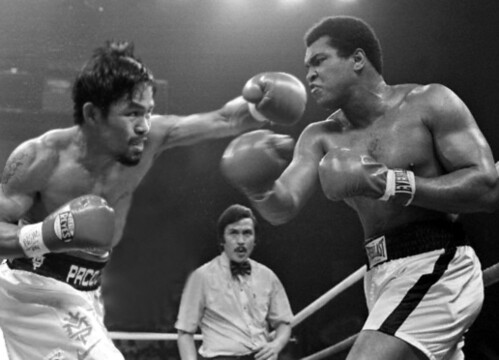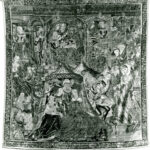Muhammad Ali, born Cassius Marcellus Clay Jr. on January 17, 1942, in Louisville, Kentucky, was one of the most influential and celebrated athletes of the 20th century. He is widely regarded as one of the greatest heavyweight boxers of all time and was known for his exceptional skills in the ring, his charismatic personality, and his outspoken views on social and political issues. Throughout his life, Ali had a profound impact on both the world of sports and society.
Ali’s interest in boxing began at a young age. He was introduced to the sport by a police officer after his bike was stolen, and he expressed a desire to “whup” the thief. He started training under the guidance of Joe Martin, a local police officer and boxing coach, who recognized his potential and talent. Ali quickly rose through the ranks, winning numerous amateur titles, including the gold medal in the light heavyweight division at the 1960 Rome Olympics.
After turning professional later that year, Ali quickly made a name for himself with his brash personality and his unorthodox fighting style. He employed a unique combination of speed, agility, and defensive techniques that baffled his opponents. Ali’s footwork, hand speed, and ability to evade punches earned him the nickname “The Greatest” and made him a formidable force in the ring.
In 1964, Ali had his first shot at the world heavyweight title against Sonny Liston. Considered a heavy underdog, Ali shocked the boxing world by defeating Liston and becoming the youngest fighter to win the heavyweight championship at the age of 22. Shortly after his victory, he announced his conversion to Islam and changed his name to Muhammad Ali, shedding his “slave name” and embracing his newfound religious and cultural identity.
Ali’s decision to join the Nation of Islam, an African American political and religious movement, and his refusal to be drafted into the Vietnam War made him a controversial figure. In 1967, he refused induction into the U.S. military on the grounds of his religious beliefs and opposition to the war, famously stating, “I ain’t got no quarrel with them Viet Cong.” This stance resulted in his boxing license being suspended, and he was stripped of his heavyweight title.
Ali’s boxing exile lasted for nearly four years, during which he became a symbol of resistance and opposition to the war. He fought for his principles, taking his case all the way to the Supreme Court, which eventually ruled in his favor in 1971. This victory marked a significant turning point in his career and allowed him to return to the sport he loved.
Upon his return, Ali faced tough opponents in some of the most memorable fights in boxing history. He engaged in legendary battles with fighters such as Joe Frazier, George Foreman, and Ken Norton. The “Fight of the Century” against Joe Frazier in 1971, and the “Rumble in the Jungle” against George Foreman in 1974, showcased Ali’s resilience, tactical brilliance, and unwavering determination.
Beyond his athletic prowess, Ali was known for his strong social and political activism. He used his platform and influence to champion civil rights and advocate for racial equality, speaking out against racism, discrimination, and injustice. Ali’s unwavering commitment to his principles and his willingness to sacrifice his career for what he believed in earned him the respect and admiration of millions around the world.
After retiring from boxing in 1981, Ali devoted himself to humanitarian work and became a global ambassador for peace and understanding. He traveled extensively, promoting goodwill between nations and raising awareness for various charitable causes. In 2005, Ali was awarded the Presidential Medal of Freedom, the highest civilian honor in the United States, for his significant contributions to society.
Muhammad Ali passed away on June 3, 2016, at the age of 74, after a long battle with Parkinson’s disease. His legacy extends far beyond the realm of sports. He left an indelible mark on the world as an athlete, a social activist, and a symbol of courage and conviction. Muhammad Ali will forever be remembered as an icon, both inside and outside the boxing ring.
Sources:
1. [Olympic.org – Muhammad Ali](https://www.olympic.org/muhammad-ali)
2. Biography.com – Muhammad Ali](https://www.biography.com/athlete/muhammad-ali)
3. [History.com – Muhammad Ali Refuses Army Induction](https://www.history.com/this-day-in-history/muhammad-ali-refuses-army-induction)
4. https://georgewbush-whitehouse.archives.gov/news/releases/2005/11/images/20051109-2_p110905pm-0224jpg-515h.html
5. https://www.nbcnews.com/news/sports/muhammad-ali-greatest-all-time-dead-74-n584776







